Geoffrey Grosenbach, author of the famous PeepCode screencasts, has written a tutorial about using Ryan Davis’ hoe library to make releasing your own RubyGems a cakewalk. Geoffrey says that using Hoe turns a laborious, multi-step twenty minute process into only a few Rake tasks. Hoe takes the automation of Gem publishing seriously, and once you’ve set it up properly you can go as far as let it post announcements (to your blog and/or Rubyforge), build your docs, create an e-mail announcement, run testing packages against the library, as well as actually releasing and uploading the gem to Rubyforge ready for public consumption. Read More
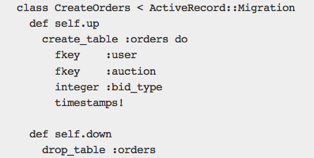
Last month, a lengthy discussion kicked off on Ruby-Talk called “Why not adopt Python style indentation for Ruby?” .. it wasn’t anything particularly new, because a similar discussion occurred six years ago. Nevertheless, a coder called Jinjing has been inspired to create Lazibi, a Ruby pre-processor to allow one to use Python style indentation within Ruby code.
It’s clever enough, but I can’t see standalone pre-processors becoming popular. It does make me think that official support for pre-processing of some sort within Ruby itself would be pretty cool though for people who want to use hacks like these. Read More
Adobe Integrated Runtime (AIR), codenamed and originally named Apollo, is a cross-operating-system runtime environment for building Rich Internet Applications, using Flash, Flex, HTML, Ajax, that can be deployed as a desktop application.

AIR has gone Public Beta, so does anybody use it? eBay does, Adobe has more, and who doesn’t love twitter?
Here are some AIR-related resources (and alternatives) that might interest you.
Related Ruby on Rails AIR ResourcesWebORB for Rails by Midnight Coders can be installed as a plugin into any Rails application to expose Ruby classes as remote services. Mike Potter created Ruby on Rails RIA SDK Read More which makes integration much easier.
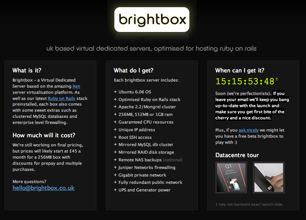
Brightbox is a soon-to-launch Rails-focused VPS hosting provider in the UK. I’ve whined about the gap in this market a few times before, so it was literally guaranteed I’d e-mail about the first attempt I was told about. They’re going to be offering Ubuntu Dapper based VPSes with an optimized Rails stack (using Apache 2.2 and Mongrel cluster) along with a mirror MySQL cluster and mirrored RAID storage. They seem set to launch on July 1st. There’s an e-mail mailing list available on the site for those who want a reminder.
In the meantime, Jeremy Jarvis of Brightbox is looking for beta testers of the service. Read More

If you want to get to Rails’ top European event, RailsConf Europe, the registration process for this year’s event is now open! If you sign up before August 6, you get €150 ($200 / £100) off the usual fee, so check it out now. The event itself is September 17-19, and general attendance for the 2 days of conference sessions will set you back €645 ($858 / £435).
Here’s an abridged version of O’Reilly’s announcement:
Co-produced by Ruby Central and O’Reilly Media, this is the largest European conference dedicated to everything Rails. [..] The three-day program spotlights particularly creative experts, industry leaders, and under-the-radar innovators worldwide. Read More
Deplate is a Ruby-based tool written by Thomas Link to convert documents written in wiki-like markup to various output formats. Supported output formats include LaTeX, HTML, “HTML slides”, DocBook (which means it can also convert to PDF, and other DocBook-supported output), and plain text.
In addition to being capable of reading various Wiki markup variants, a particularly interesting feature is it also handles rdoc input which is very handy for generating print-ready documentation of your Ruby projects.
To see the results for yourself, various samples of Deplate generated output are available for your viewing pleasure. To get it, you can download the stable version from Deplate project files page or check out its latest development version from CVS. Read More
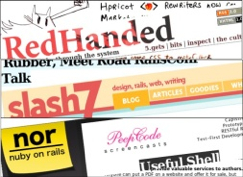
Peter Szinek (of ScRUBYt! fame) has put together a script that works out the “top 10 Ruby / Rails blogs” using data from Alexa and Technorati. Check out the results! Ruby Inside comes in at #2.
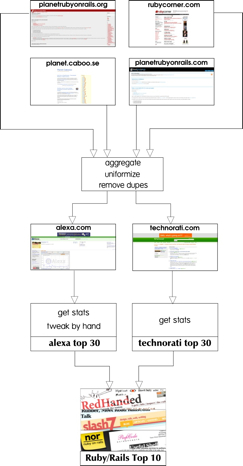
For those more interested in the technique than the results, Peter has also put together an article showing how he used ScRUBYt and other sites and APIs to pull it off along with some of the source code involved. Read More

The tutorial-writing geniuses over at RailsEnvy.com have unveiled their latest work.. “Ruby on Rails Rake Tutorial (aka. How Rake turned me into an alcoholic)“. It’s a solid, and amusingly illustrated, overview of Rake, how it works, how it works alongside Rails, and so forth. Read More
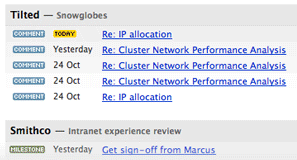
relative_time_helpers is a straightforward, but very useful Rails plugin by Rick Olson that formats timestamps to human-friendly relative dates. You’re probably already using Rails’ built-in time_ago_in_words helper in your applications, but Rick’s relative_time gives even better results:
<%= relative_time(Time.now) %>
# today
<%= relative_time(1.day.ago) %>
# yesterday
<%= relative_time(1.day.from_now) %>
# tomorrow
<%= relative_time_span([Time.now, 5.days.from_now]) %>
# May 17th – 22nd
To install it: Read More
script/plugin install http://ar-code.svn.engineyard.com/plugins/relative_time_helpers
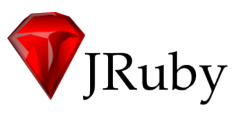
JRuby, a Java implementation of the Ruby interpreter, has reached version 1.0. A massive congratulations are due to the team. At the time of writing, the release has not been announced on the official site, but you can download the final build.
JRuby originally came into being in 2001 as a simple Java port of the Ruby 1.6 code, but has blossomed into a free-standing project that has chosen to innovate in its own way. In September 2006, Sun “acquired” the JRuby project by bringing its then two main developers on board, and since then work appears to have continued at a rapid pace. Read More
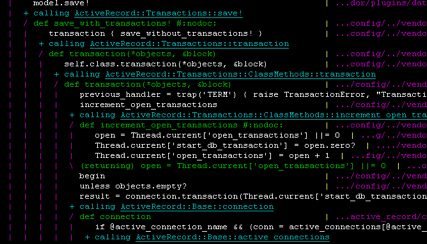
Ruby Unroller is an exciting tool developed by Tyler Rick that generates human readable execution traces of running Ruby scripts. It can display the code currently being executed by a script in real-time, as it’s actually executed. This makes it a great tool for getting familiar with, say, the darkest depths of Rails, or for debugging troublesome scripts that rely on external Ruby libraries. Read More
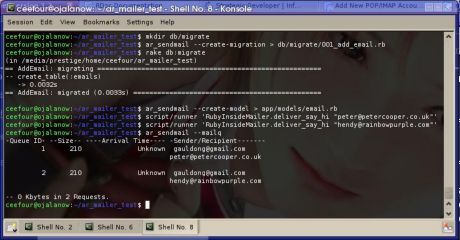
ar_mailer is a Ruby gem by Eric Hodel (a ZenTest core developer) that works with Rails to store outgoing e-mail messages into the database for later delivery by a separate ar_sendmail process. This is handy because delivering e-mails can take a long time if performed before rendering pages, especially if you have hundreds of messages to send!
Version 1.2.0 adds TLS (Transport Layer Security) support and numerous other bug fixes and updates. To install:
gem install ar_mailer
Note: If you still get the old 1.1.0 version even after doing a gem install, you can download the .gem file directly from Seattlerb Rubyforge Project Page. Read More
Standout Jobs Need a Ruby Guru
Standout Jobs are looking for a Ruby guru, and they’ve put together a whole video explaining who they are and what they’re looking for. I think more people should be posting job ads in this way.. it makes me feel a lot better informed about who they are than a dry list of job benefits.
Animated Ruby on Rails “Commercial”
Thanks to Jay Phillips for pointing this one out. It’s a reasonably content-free but humor-full animated commercial for Ruby on Rails.
RailsEnvy “Rails Vs.” Commercials
Every RailsConf attendee will already be familiar with these videos, produced in the same vein as the “Mac vs PC” Apple commercials, but in case you’re not.. Read More


Textpow and Ultraviolet are a pair of interesting, new(ish) Ruby libraries that co-operate together to parse TextMate bundles and perform syntax highlighting. Textpow is a library that parses and processes the TextMate bundles (special files included with the TextMate text editor that specify how different types of plain text content should be delimited and colored). Ultraviolet then uses Textpow and performs syntax highlighting either as a standalone application or as a Ruby library.
Currently, Textpow can process syntax (tmLanguage and tmSyntax) and theme (tmTheme) files.. and you can obtain these from the free trial download of TextMate if you don’t have them already (although, I imagine, non OS X users might be able to find other TextMate bundles and themes elsewhere, such as the Vibrant Ink theme downloadable from here). Read More
Just a couple of weeks ago, the XRuby team released XRuby 0.2.0. XRuby is Ruby-to-Java bytecode compiler, so you can compile Ruby source code directly to Java classes. The latest version fixes several issues and adds debugging support.
The goal of this project is similar to JRuby, to run Ruby applications on the Java Virtual Machine. Each takes a different approach however. JRuby uses an interpreter written in Java to execute Ruby code at runtime. XRuby, on the other hand, compiles the Ruby code to Java bytecode (although JRuby is introducing a feature which also does this – the JIT perform of JRuby is beginning to become impressive) which means there is less overhead and potentially increased performance. Read More







